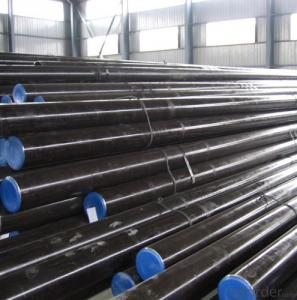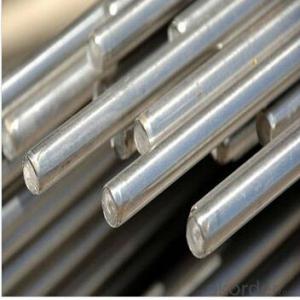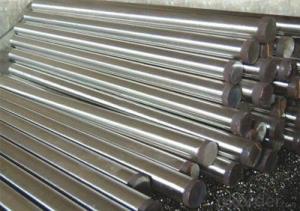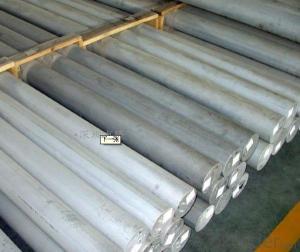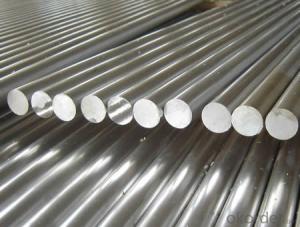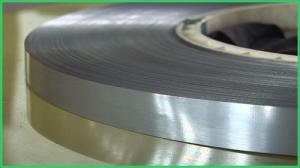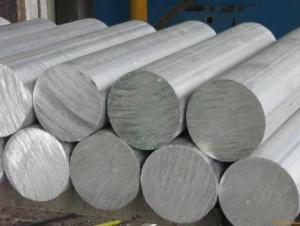Spring Steel Round Bar High Quality
- Loading Port:
- China Main Port
- Payment Terms:
- TT or LC
- Min Order Qty:
- -
- Supply Capability:
- -
OKorder Service Pledge
OKorder Financial Service
You Might Also Like
Product Description:
OKorder is offering Bearing steel at great prices with worldwide shipping. Our supplier is a world-class manufacturer of steel, with our products utilized the world over. OKorder annually supplies products to European, North American and Asian markets. We provide quotations within 24 hours of receiving an inquiry and guarantee competitive prices.
Product Applications:
Spring Steel can be divided into two types. One is carbon spring steel, and other one is alloy spring steel.
Alloy spring steel is based on carbon spring steel, by adding one or more alloying elements to improve the mechanical properties, hardenability and other properties to meet the requirement for manufacturing all kinds of spring steel.
Product Advantages:
OKorder's Bearing steel are durable, strong, and resist corrosion.
Main Product Features:
· Premium quality
· Prompt delivery & seaworthy packing (30 days after receiving deposit)
· Corrosion resistance
· Can be recycled and reused
· Mill test certification
· Professional Service
· Competitive pricing
Product Specifications:
-Material: 70Si2CrA
-Production: Hot rolled or cold rolled
-Standard: GB/T·5218-1999
-Type: Spring Steel
-Alloy or no: Alloy
Chemical Composition:
C | Mn | Si | Cr |
0.65~0.75 | 0.40~0.60 | 1.40~1.70 | 0.20~0.40 |
S | P | Ni | |
≤0.030 | ≤0.030 | ≤0.030 |
Mechanical Properties:
-Annealing Condition:
1, Tensile Strength: σb/MPa:≤835
2, Elongation: δ/%:≥8
-Quencher condition:
1, Tensile strength: σb/MPa:785~1175
2, Elongation: -
Packaging & Delivery of Spring Steel:
-Packing Detail: The products can be packed in bundles by steel wires.
-Marks:
1, Tag marks: the tag marks will be tied up to each bundle of the products. The information is usually including supplier’s logo and name, product name, made in China, products’ specifications, the painted color and other information requested by customers.
2, Color marks: we will paint both ends of the bundles of these products to make sure that they are more evident. It’s will be more convenient for the customers to distinguish them at the destination port.
-Delivery Detail:
1, Delivery time: 30~45 working days after receive buyer’s T.T. or L/C.
2, Delivery status should be written in the contract. (Heat treatment or no)
FAQ:
Q1: Why buy Materials & Equipment from OKorder.com?
A1: All products offered byOKorder.com are carefully selected from China's most reliable manufacturing enterprises. Through its ISO certifications, OKorder.com adheres to the highest standards and a commitment to supply chain safety and customer satisfaction.
Q2: How do we guarantee the quality of our products?
A2: We have established an advanced quality management system which conducts strict quality tests at every step, from raw materials to the final product. At the same time, we provide extensive follow-up service assurances as required.
Q3: How soon can we receive the product after purchase?
A3: Within three days of placing an order, we will begin production. The specific shipping date is dependent upon international and government factors, but is typically 7 to 10 workdays.
Images:
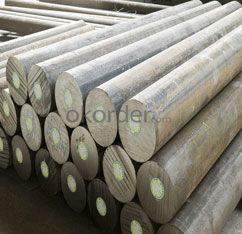
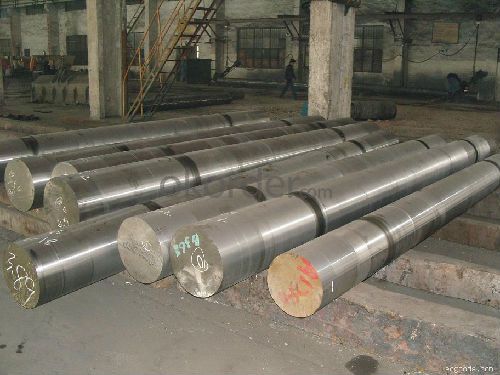
- Q: Can special steel be used for making cutting tools?
- Yes, special steel can be used for making cutting tools. Special steel, also known as tool steel, is specifically designed and manufactured to have excellent hardness, wear resistance, and toughness properties, making it highly suitable for cutting tool applications. The unique composition and heat treatment processes of special steel enable it to withstand high temperatures and maintain sharp cutting edges, ensuring efficient and durable performance for cutting tools.
- Q: How does special steel perform in terms of corrosion resistance in marine environments?
- Special steel, also known as stainless steel, performs exceptionally well in terms of corrosion resistance in marine environments. The high levels of chromium and nickel present in the alloy composition of special steel make it highly resistant to corrosion caused by saltwater and other corrosive elements present in marine environments. The chromium content in special steel forms a protective oxide layer on its surface known as the passive layer. This passive layer acts as a shield, preventing the steel from coming into direct contact with corrosive elements. It effectively blocks oxygen and moisture from reaching the underlying steel, thereby inhibiting corrosion. Additionally, the presence of nickel in special steel enhances its corrosion resistance even further. Nickel improves the stability of the passive layer and increases its ability to self-repair if it gets damaged. This property makes special steel highly reliable and long-lasting in marine environments, where exposure to saltwater, high humidity, and varying temperatures can accelerate corrosion processes. Furthermore, special steel offers excellent resistance to pitting corrosion and crevice corrosion, which are common types of corrosion encountered in marine environments. Pitting corrosion occurs when localized areas of the steel's surface are attacked, resulting in small pits or holes. Crevice corrosion occurs in confined spaces such as gaps or joints, where stagnant water or debris can accumulate and accelerate corrosion. Special steel's resistance to these types of corrosion ensures its durability and integrity in marine applications. Overall, special steel demonstrates outstanding corrosion resistance in marine environments due to its high chromium and nickel content. Its ability to form a protective passive layer, resist pitting and crevice corrosion, and self-repair makes it a preferred choice for various marine applications, including shipbuilding, offshore structures, and seawater desalination plants.
- Q: Can special steel be used in the production of springs?
- Yes, special steel can be used in the production of springs. Special steel, such as alloy steel, is often preferred for manufacturing springs due to its high strength, durability, and resistance to deformation. It allows for the production of springs that can withstand heavy loads, maintain their shape over time, and provide reliable performance in various applications.
- Q: What are the different methods of joining special steel?
- There are various techniques available for joining special steel, each presenting its own advantages and limitations. Some of the most frequently employed methods comprise: 1. Welding: The most prevalent technique for joining steel involves melting the base material and incorporating a filler material to establish a robust connection. Depending on the specific requirements, different welding techniques like arc welding, gas welding, and laser welding can be utilized. 2. Brazing: This approach necessitates heating the steel and melting a filler metal with a lower melting point, which then infiltrates the joint through capillary action. Brazing is commonly employed when joining dissimilar metals or when a lower-temperature joining process is indispensable. 3. Soldering: Similar to brazing, soldering also employs a filler material with a lower melting point to join the steel. However, soldering involves melting the filler material without melting the base material. It is often employed for electrical connections and delicate applications. 4. Mechanical fastening: This method entails utilizing mechanical means such as bolts, screws, rivets, or other types of fasteners to join the steel components. Mechanical fastening is frequently favored in situations where disassembly or maintenance is necessary. 5. Adhesive bonding: Special steel can also be joined using adhesives that establish a sturdy bond between the surfaces. Adhesive bonding is suitable for joining intricate shapes, minimizing stress concentrations, and providing exceptional corrosion resistance. 6. Friction welding: This technique involves the application of pressure to rub or spin two steel components together, generating heat that creates a bond. Friction welding is commonly employed for joining high-strength or heat-treated steels. 7. Explosive welding: This method employs explosives to facilitate a high-speed collision between two steel surfaces, resulting in a bond formed in a solid state. Explosive welding is frequently used for joining dissimilar metals or when high strength and corrosion resistance are required. The selection of the appropriate joining method depends on factors such as the type of steel, the desired strength and durability of the joint, the specific application requirements, and the availability of equipment and expertise.
- Q: How does special steel perform in terms of impact resistance?
- Special steel generally performs well in terms of impact resistance. It is specifically engineered to have higher toughness and strength, allowing it to withstand impacts and deformations without fracturing or breaking easily. This makes special steel an excellent choice for applications that require durability and protection against sudden forces or impacts, such as in manufacturing machinery, construction equipment, and automotive components.
- Q: What are the different types of tool steels used in special steel?
- There are various types of tool steels that are commonly used in special steel applications. These types of steels are specifically designed to exhibit exceptional hardness, wear resistance, toughness, and heat resistance, making them ideal for tooling and cutting applications. Some of the different types of tool steels used in special steel include: 1. Carbon Tool Steel: This type of tool steel contains high carbon content, typically ranging from 0.60% to 1.5%. It offers excellent hardness and wear resistance, making it suitable for applications such as drills, taps, and cutting tools. 2. High-Speed Steel (HSS): HSS is an alloy steel that contains a combination of various elements like tungsten, molybdenum, chromium, and vanadium. It provides exceptional heat resistance, hardness, and toughness, allowing it to retain its cutting edge even at high temperatures. HSS is commonly used in drill bits, milling cutters, and other cutting tools. 3. Cold Work Tool Steel: This type of tool steel is designed to be used at room temperature or lower temperatures. It offers excellent toughness, wear resistance, and strength. Cold work tool steels are used in applications such as blanking, piercing, and forming dies. 4. Hot Work Tool Steel: Hot work tool steels are specifically developed to withstand high temperatures without losing their hardness and strength. They have good thermal conductivity and can resist thermal fatigue and deformation. Hot work tool steels are used in applications like forging dies, extrusion dies, and die casting molds. 5. Shock-Resisting Tool Steel: This type of tool steel is designed to resist shock and impact loads. It provides excellent toughness, strength, and wear resistance. Shock-resisting tool steels are commonly used in applications such as hammers, chisels, and pneumatic tools. 6. Stainless Tool Steel: Stainless tool steels contain high levels of chromium, which provides them with excellent corrosion resistance. These steels are commonly used in applications where resistance to rust and corrosion is essential, such as surgical instruments, molds, and cutlery. 7. Powder Metallurgy Tool Steel: Powder metallurgy tool steels are manufactured using a powder metallurgy process, which allows for precise control of the steel's composition and microstructure. These steels exhibit excellent wear resistance, high toughness, and good machinability. They are used in applications such as high-speed cutting tools and forming tools. Overall, the different types of tool steels used in special steel applications offer a wide range of characteristics and properties to meet the specific requirements of various cutting, forming, and tooling applications.
- Q: What are the different heat-resistant grades of special steel?
- There are several heat-resistant grades of special steel that are specifically designed to withstand high temperatures and thermal stress. Some of the commonly used heat-resistant grades include: 1. Stainless Steel 310: This grade of stainless steel is known for its excellent resistance to high temperatures, oxidation, and corrosion. It can withstand temperatures up to 1100°C (2012°F) and is often used in furnace parts, heat treatment baskets, and other heat-intensive applications. 2. Inconel 600: Inconel 600 is a nickel-chromium alloy that offers exceptional resistance to high temperatures and oxidation. It can operate effectively in temperatures ranging from cryogenic to 1093°C (2000°F) and is widely used in gas turbines, heat exchangers, and other high-temperature environments. 3. Hastelloy C-276: Hastelloy C-276 is a nickel-molybdenum-chromium alloy that offers excellent resistance to a wide range of corrosive environments and high temperatures. It can withstand temperatures up to 1093°C (2000°F) and is commonly used in chemical processing, power generation, and pollution control applications. 4. Titanium Grade 2: Titanium Grade 2 is a commercially pure titanium alloy that exhibits good resistance to high temperatures and corrosion. It can operate effectively in temperatures up to 538°C (1000°F) and is often used in heat exchangers, chemical processing equipment, and marine applications. 5. Alloy 617: Alloy 617 is a nickel-chromium-cobalt-molybdenum alloy that offers exceptional strength and resistance to high-temperature environments. It can withstand temperatures up to 1204°C (2200°F) and is commonly used in gas turbines, petrochemical plants, and other heat-intensive industries. These are just a few examples of the heat-resistant grades of special steel available in the market. The selection of the appropriate grade depends on the specific temperature requirements, corrosion resistance, and mechanical properties needed for the application.
- Q: What are the main applications of special steel in the power generation sector?
- Special steel is widely used in the power generation sector for various applications. Some of the main applications include turbine components, such as blades and rotors, which require high strength and temperature resistance to withstand the harsh operating conditions. Special steel is also used in the construction of boilers and pressure vessels, where its corrosion resistance and high tensile strength are essential. Additionally, special steel is utilized in the manufacturing of power transmission infrastructure, such as transmission lines and transformers, to ensure efficient and reliable electricity transfer. Overall, special steel plays a crucial role in enhancing the performance and longevity of power generation equipment in the industry.
- Q: How does special steel ensure dimensional stability?
- Special steel ensures dimensional stability through a combination of factors such as controlled composition, precise heat treatment, and careful manufacturing processes. The specific composition of special steel is designed to have a lower coefficient of thermal expansion, which means it expands and contracts less with changes in temperature compared to regular steel. This ensures that the dimensions of the steel remain stable even under varying temperature conditions. Additionally, the heat treatment process further enhances the dimensional stability by refining the microstructure and reducing internal stresses. The careful manufacturing processes, including precise machining and quality control, also contribute to maintaining dimensional stability in special steel products.
- Q: How does special steel resist oxidation?
- Special steel resists oxidation due to the presence of alloying elements, such as chromium, that form a protective layer of chromium oxide on the surface of the steel. This layer acts as a barrier, preventing oxygen from reaching the underlying steel and thus inhibiting the oxidation process.
Send your message to us
Spring Steel Round Bar High Quality
- Loading Port:
- China Main Port
- Payment Terms:
- TT or LC
- Min Order Qty:
- -
- Supply Capability:
- -
OKorder Service Pledge
OKorder Financial Service
Similar products
Hot products
Hot Searches
Related keywords
